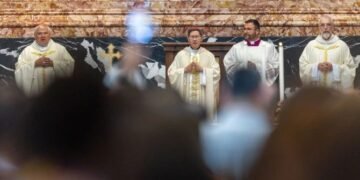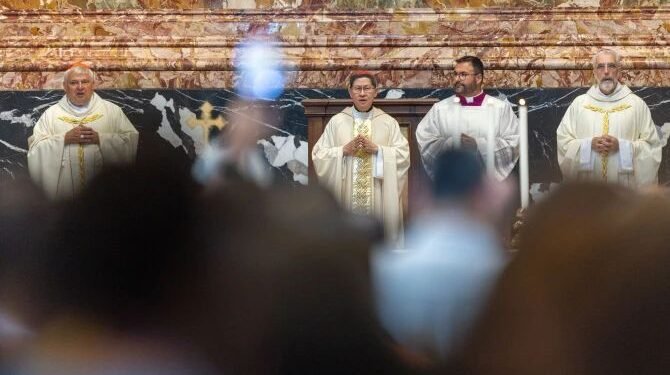By Charles Igwe
Cardinal Luis Antonio Tagle has delivered a passionate call for discernment and authentic Christian witness to over 1,700 Catholic digital content creators gathered in Rome for the inaugural Jubilee of Digital Missionaries and Catholic Influencers.
Preaching during a special Mass at St. Peter’s Basilica on July 29, Tagle reminded the attendees — drawn from 75 countries — that they are not just influencers, but missionaries entrusted with the Gospel in an age of algorithms, deepfakes, and digital distraction.
“You are not only influencers, you are also missionaries,” he declared. “Dear digital missionaries and Catholic influencers: Jesus loves you. Do not doubt Him. Accept Him as the greatest influence on your life. And through you, may the person of Jesus influence many people — in human and digital spaces — so that God’s truth, justice, love, and peace may flow to the ends of the earth.”
The Jubilee — jointly organized by the Dicastery for Evangelization and the Dicastery for Communication — marked a historic first: a Vatican-led gathering specifically designed for the new generation of digital apostles shaping Catholic discourse on Instagram, YouTube, TikTok, and beyond.
Under the colonnades and dome of St. Peter’s, faith and filters mingled as young influencers swapped social media handles, recorded vlogs, and captured selfies in the glow of a new kind of mission field.
“Everybody here is after the same thing,” said 24-year-old American participant Sophie Chamblee, founder of Playground Saints, an Instagram page followed by over 59,000 people. “We all understand each other in ways others can’t.”
But Tagle’s homily wasn’t just celebratory. It was a spiritual intervention, warning of the hidden perils of digital fame and manipulation. He shared that he had recently discovered a deepfake video featuring him — without his consent — advertising arthritis medication.
“To influence consumers so that monetary profit may increase, some manufacturers resort to false advertising, even using famous personalities,” Tagle explained. “I discovered videos generated by I don’t know who, of me advertising medicine for arthritis.”
Such digital distortions, he warned, reveal the deeper risks at play when technology is detached from truth. “Will we let the water and blood of Jesus poured for love of us be the true fluid of influence?” he asked. “Or will we allow falsehood, injustice, manipulation, and violence to shape our digital witness?”
“God did not send us a text message or an email,” Tagle continued. “Rather, God sent His Son. Love cannot be generated by an algorithm. Only a divine person with a human heart can love divinely and humanly, effecting profound and enduring change.”
As the Mass drew to a close, the influencers were surprised by the arrival of Pope Leo XIV, who entered the basilica to a sea of smartphones and cheers. Moving fluently between Italian, English, and Spanish, the pope built on Tagle’s call, encouraging creators to prioritize real human connection over metrics.
“Science and technology influence how we live, understand ourselves, and relate to God and others,” Pope Leo said. “But nothing that comes from human creativity should ever be used to diminish the dignity of others.”
He urged influencers to “nurture a culture of Christian humanism,” particularly as artificial intelligence continues to reshape communication worldwide. “This is not just about creating content,” the pope said. “It is about creating an encounter between hearts.”
“This is our challenge,” Leo concluded, “to develop a way of thinking and a language that gives voice to love — the love of Jesus Christ.”







































